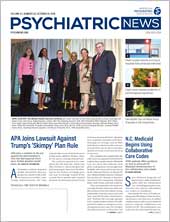Clinicians have known for a while that the risk of depression in women increases with the onset of perimenopause—a transitional period characterized by biological changes in hormone levels. However, there has been less consensus on how to properly identify and treat depression that arises during this period.
An expert panel last month released the first-ever guidelines for the evaluation and treatment of perimenopausal depression. The guidelines, jointly published September 5 in the journals Menopause and the Journal of Women’s Health, address five clinical topics: the epidemiology of depressive symptoms in perimenopausal women; the clinical presentation of perimenopausal depression; the effects of antidepressants; the effects of hormone therapy; and the effects of other interventions such as psychotherapy, exercise, and natural products.
The 11-member expert panel was convened by the North American Menopause Society and the National Network on Depression Centers Women and Mood Disorders Task Group. Panel members were divided into subgroups based on their expertise into one of these five topic areas. Each subgroup reviewed the available literature for their topic and drafted a set of recommendations. Each subgroup was also assigned to review the recommendations of one of the other topic areas. The two panel co-chairs then prepared the final guidelines based on the collected feedback.
“The reason these guidelines are needed is because depression during the perimenopausal phase occurs alongside other menopausal symptoms,” said panel co-chair Pauline Maki, Ph.D., a professor of psychology and psychiatry at the University of Illinois at Chicago College of Medicine, in a statement. These symptoms include sleep problems, sexual dysfunction, fatigue, and difficulty concentrating.
“These perimenopause symptoms can co-occur with and complicate the presentation of depression, and it can be challenging to disentangle the symptoms and diagnoses,” said panel co-chair Susan Kornstein, M.D., a professor of psychiatry at Virginia Commonwealth University. “Clinicians should also be aware of the unique psychosocial stressors for women during midlife, such as caring for both children and elderly parents, death of parents, children leaving home, career and relationship shifts, and personal and family illness.”
As noted in the guidelines, there are no menopause-specific mood-disorder scales available, but general depression screening tools such as the Patient Health Questionnaire (PHQ-9) can be used. Validated scales for menopause symptoms, such as the Menopause Rating Scale (MRS) or Menopause-Specific Quality-of-Life Scale (MENQOL), also include measures related to mood, which may assist in clarifying the contribution of menopause to the patient’s overall symptom profile.
Once a depression diagnosis is made, the treatment options are similar to those used with other patients with depression. According to the guidelines, antidepressants and psychotherapies (particularly cognitive-behavioral therapy) remain the frontline choices for treating major depressive episodes during perimenopause.
Among antidepressants, the serotonin-norepinephrine reuptake inhibitor (SNRI) desvenlafaxine has the most clinical evidence to support its use in perimenopausal women. Two large randomized clinical studies have demonstrated that desvenlafaxine improves mood symptoms in perimenopausal women relative to placebo. Smaller clinical studies have also suggested that other SNRIs, selective serotonin reuptake inhibitors (SSRIs), and the tetracyclic antidepressant mirtazapine are effective at improving mood and other perimenopausal symptoms.
“Since desvenlafaxine is the only antidepressant that has been studied in large placebo-controlled studies in peri- and post-menopausal women, I would consider it a frontline choice,” Kornstein told Psychiatric News. “However, other factors need to be considered, such as previous antidepressant response in women with prior episodes of depression.”
Depending on the exact profile and severity of symptoms (for example, if mood changes are predominantly due to menopausal vasomotor symptoms such as hot flashes or night sweats), estrogen replacement therapy is another pharmacological option. Multiple studies have found that hormone therapy has antidepressant effects when administered to perimenopausal women. Additional research also suggests that estrogen therapy can augment the effect of antidepressants.
Nonetheless, the guidelines recommend that a combination strategy of antidepressants plus estrogen should be used with caution and preferably limited to patients with strong somatic symptoms like vasomotor problems.
“On the whole, the guideline conclusions are a fair and accurate summation of the published literature,” said David Rubinow, M.D., the Assad Meymandi Distinguished Professor and Chair of Psychiatry and director of the Center for Women’s Mood Disorders at the University of North Carolina.
He added that while the guidelines emphasize the role of a history of depression as an important risk factor for perimenopausal depression, he cautioned that many women enter midlife with no prior depression. “[P]ractitioners need to remain vigilant no matter the woman’s history.” ■
“Guidelines for the Evaluation and Treatment of Perimenopausal Depression: Summary and Recommendations” can be accessed
here.


